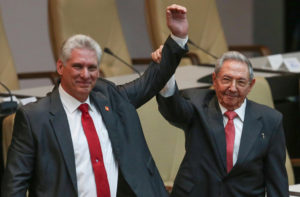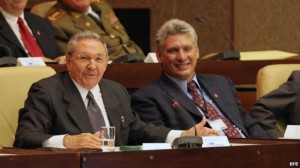Miguel is following Raúl as Raúl Followed Fidel.
With apologies to my Spanish-speaking readers, nothing describes Cuba’s national development quite like the French epigram plus ça change, plus c’est la même chose. It means the more it changes the more it remains the same. And that, in a nutshell, is Cuba.
Cuba’s National Assembly cleared the way for the end of Castro rule on Wednesday, naming longtime Communist Party figure Miguel Díaz-Canel as the sole candidate for head of state.
The move virtually ensured that the 57-year-old Díaz-Canel – long groomed for leadership – would replace President Raúl Castro as the island’s leader and close out nearly 60 years of control by Fidel Castro, who died in 2016 at age 90, and his younger brother Raúl.
(The Chicago Tribune, April 18, 2018)
 The above notwithstanding, many commentators are hailing this occasion as the “end of Castro rule.” But they are overstating the transition afoot.
The above notwithstanding, many commentators are hailing this occasion as the “end of Castro rule.” But they are overstating the transition afoot.
After all, Raúl (86) will retain his position as first secretary of the all-powerful Communist Party. And, as he himself famously proclaimed when he became acting president in 2006:
Fidel’s substitute can only be the Communist Party of Cuba.
This is why Dìaz-Canel’s duties as president will be mostly ceremonial. Indeed, it speaks volumes that both Fidel and Raúl served as president AND first secretary for as long as they wanted. By contrast, Dìaz-Canel is serving only as president. What’s more, a new decree means that he can only serve for two five-year terms.
Mind you, if Raúl dies a “timely” death and Dìaz-Canel plays his cards right, he could pull a Xi. Specifically, he could emulate Chinese President Xi Jinping by getting the Communist Party to rubberstamp his ambition to serve as president and first secretary … for life.
To be fair, there is cause to hail Dìaz-Canel in at least one respect. It relates to his declared intent to prescribe the most effective antidote for President Trump’s regressive policies:
‘Today, with the development of social media… and the Internet, it’s almost delusional to try to prohibit it, it doesn’t make any sense,’ said Dìaz-Canel, who can often be seen with a tablet under his arm.
(France 24, April 18, 2018)
Of course, not prohibiting access is not the same as not censoring it. In fact, social media and the Internet in Cuba are bound to mirror the same in China – complete with state-controlled limitations.
 More to the point, though, Dìaz-Canel will likely follow Raúl’s prescription for implementing greater economic and social freedoms, while retaining totalitarian political control (a.k.a. the China model for national development). This, despite reports that the well-indoctrinated Dìaz-Canel is even more wary of market-oriented reforms than the reform-minded Raúl.
More to the point, though, Dìaz-Canel will likely follow Raúl’s prescription for implementing greater economic and social freedoms, while retaining totalitarian political control (a.k.a. the China model for national development). This, despite reports that the well-indoctrinated Dìaz-Canel is even more wary of market-oriented reforms than the reform-minded Raúl.
Unfortunately, Dìaz-Canel will face many of the same obstacles Fidel faced. This, because President Trump made quite a show last year of retightening many of the restrictions on travel to and trade with Cuba — restrictions which President Obama won universal praise for loosening.
Here in part is how I commented on this regression in “Trump’s Hypocrisy on Human Rights: Cuba vs. Qatar,” June 16, 2017.
____________________
I know, complaining about President Trump’s hypocrisy is rather like complaining about a prostitute’s promiscuity. … Trump’s America-First policy towards Cuba amounts to little more than pandering to Miami Cubans, while cutting off America’s nose to spite its face. …
There’s no denying that these changes will hurt many Cubans in their pocket books. … But, as it was for the 55 years before Obama normalized relations, these changes will not chasten Cuba’s ruling elite politically or hurt them financially. On the contrary, Canada and Europe will now be competing with Russia and China to pick up every slack America’s retreat creates.
Apropos of new restrictions, Trump clearly couldn’t care less about making it inconvenient for ordinary Americans to travel to Cuba. But it speaks volumes about his hypocrisy that he’s planning to deny American businessmen the very opportunities in Cuba that he himself was seeking to exploit just years ago.
[Caribbean News Now published a comprehensive report on his futile efforts on April 17. It noted that ‘Trump had been actively seeking to take advantage of Obama’s opening to Cuba, which created a wide range of exceptions to the embargo, including allowing U.S. companies to do business on the island.
Between 2012 and 2015, several Trump Organization executives responsible for developing golf properties traveled to Cuba repeatedly.’]
Then, of course, there’s the self-defeating prospect of Trump provoking Cuba to cease all cooperation on regional anti-terror and anti-drug efforts.
In other words, these changes only provide further vindication for those of us who maintain that this president is just plain STUPID (i.e., self-absorbed, tendentious, unhinged, pusillanimous, insecure, and delusional).
____________________
That said, what I find most significant about this occasion has more to do with enduring racism than ending an era.
A browse of my weblog will show that I have written too many commentaries on Cuba to count. But it just so happens that I wrote one five years ago that not only heralded Dìaz-Canel’s (s)election but also synthesized my views on Cuba’s political, economic, and social development.
Here, in its entirety (fear not, it’s relatively brief), is “Castros’ (White) Successor Highlights Racism in Cuba,” March 1, 2013.
**********
I am among those who have been agitating for years for the United States to lift its hypocritical, unconscionable, and demonstrably misguided embargo against Cuba. Not least because the people who have been (and are being) harmed most by it are poor Cubans, the majority of whom are Black.
Instead of merely extolling the Pope’s moral authority, President Bush should rise above political pandering and heed his call to end America’s inhumane and immoral embargo against Cuba. After all, when a communist dictator can claim papal sanction to dismiss the president of the United States as a hypocrite, this alone should cause a God-fearing president like George W. Bush to reexamine his policies, if not his soul.
(“President Bush, Seal Your and Pope’s Legacy, Lift Embargo Against Cuba,” The iPINIONS Journal, April 11, 2005)
I have even suggested that the same moral and pragmatic principle that is leading President Obama to hold direct talks with Iran is leading him to normalize relations with Cuba. In doing so, he is redressing patently flawed policies, which his predecessors pursued, in both cases, for far too long.
But I have always been keen to distinguish between normalizing relations with Cuba and supporting the Castro regime.
 This brings me to the announcement Rául Castro (81) made this week. He announced that Miguel Díaz-Canel (52) is the anointed one to succeed him.
This brings me to the announcement Rául Castro (81) made this week. He announced that Miguel Díaz-Canel (52) is the anointed one to succeed him.
It is surreal enough that Díaz-Canel will have to cool his heels for another five years until Rául officially retires in 2018. But if Fidel handing power to Rául did not betray all pretense of democratic socialism in Cuba, surely Rául anointing Díaz-Canel his successor does.
Bear in mind that Cuba is predominantly black. Yet it seems no black stood a snowball’s chance in Hell of succeeding Rául. Even worse, though, none of the Castros’ political enablers in Africa or the Caribbean seem the least bit troubled by this apartheid-like succession.
Indeed, black democratic leaders have been visiting Cuba for years, wearing their show of political solidarity with defiant pride. Remarkably, they seem oblivious to the message of racial betrayal, which their visits convey. But their pilgrimages to Cuba must be even more disheartening to black Cubans than those white democratic leaders made to Apartheid South Africa must have been to black South Africans.
 This might seem unduly provocative, if not uniformed, given Fidel’s propaganda about his revolution ending racial inequality. Except that my contention is supported by no less a person than Dr. Esteban Morales Domínguez. He is a professor of Economics and Political Science at the University of Havana and a member of the Cuban Academy of Sciences.
This might seem unduly provocative, if not uniformed, given Fidel’s propaganda about his revolution ending racial inequality. Except that my contention is supported by no less a person than Dr. Esteban Morales Domínguez. He is a professor of Economics and Political Science at the University of Havana and a member of the Cuban Academy of Sciences.
Here — courtesy of his Challenges of the Racial Problem in Cuba (Havana: Editorial de Ciencias Sociales, 2008) — are just a few Apartheid-like statistics about life in Cuba:
- Blacks have only 5% interests in state cooperatives and with growing privatizing of land, they will be totally disenfranchised.
- Cuba’s total civil and public leadership is predominantly white (71%), despite a black population of somewhere between 62-72%.
- Privately owned land is 98% white.
Moreover, here’s how Dr. Morales himself debunked the myth of Castro’s revolution ushering in a new era of racial equality in the October-December 2008 quarterly magazine Temas:
The way power is distributed in present-day Cuban society does not go beyond what existed prior to 1959. White dominance is still forcefully expressed, especially at the level of what is called the ‘new economy.’ This is especially evident in the absence of Blacks in the upper leadership levels of the state, government and institutions of civil society in general.
Granted, Dr. Morales states (and I readily acknowledge) that the Castros took commendable steps to eradicate institutional racism in the early years of their revolution. But even though recognized as equal in the eyes of the law, blacks were (and still are) denied equal opportunity to excel in practically every aspect of life in Cuba.
Indeed, it is a damning indictment of not only Castro’s leadership but also the political judgment of anyone who glorifies him that the vast majority of black Cubans live in more squalid conditions today – 47 years into his socialist revolution – than they did under the apartheid-style dictatorship of Fulgencio Batista, the man he overthrew.
(“Dancing on Castro’s Grave Is Not Only Unseemly; It’s Premature,” The iPINIONS Journal, August 2, 2006)
 This is why I have continually admonished those, especially blacks, who stand so proudly in solidarity with the Castros to be mindful of the contradiction, if not the betrayal, inherent in doing so. It is also why I have continually suffused calls for the United States to end its embargo with calls for the Castros to end their apartheid-like rule.
This is why I have continually admonished those, especially blacks, who stand so proudly in solidarity with the Castros to be mindful of the contradiction, if not the betrayal, inherent in doing so. It is also why I have continually suffused calls for the United States to end its embargo with calls for the Castros to end their apartheid-like rule.
Finally, just as no credible commentary on Cuba can fail to mention the embargo, none can fail to mention the Cuban exiles who are primarily responsible for keeping it in place.
Accordingly, consider this:
Only unbridled conceit and arrogance among Miami Cubans explain their support for continuing the embargo … until kingdom come if necessary. Nothing betrays this quite like them presuming that — once the Castro brothers die off — they’ll be able to return to Cuba to inherit the political power and social privileges they or family members abdicated decades ago. And they presume this prerogative without any regard for the (mostly black) Cubans who have been toiling at home, waiting for their opportunity to govern their country.
Except that, at this rate, I fear a well-indoctrinated Elian Gonzalez will be Cuban dictator before Miami Cubans are disabused of their antic pining for their paradise lost.
(“Dancing on Castro’s Grave Is Not Only Unseemly; It’s Premature,” The iPINIONS Journal, August 2, 2006)
In other words, there is no doubt that, when he assumes power, the only mandate Díaz-Canel will recognize is that which compels him to honor the Castros’ legacy.
¡Viva la Revolución?
**********
Related commentaries:
Bush…lift embargo…
Dancing on Castro’s grave…
Castro admits his model has failed
Trump reverses Obama policies…
Castros’ white successor…
* This commentary was originally published at Caribbean News Now on Friday, April 20